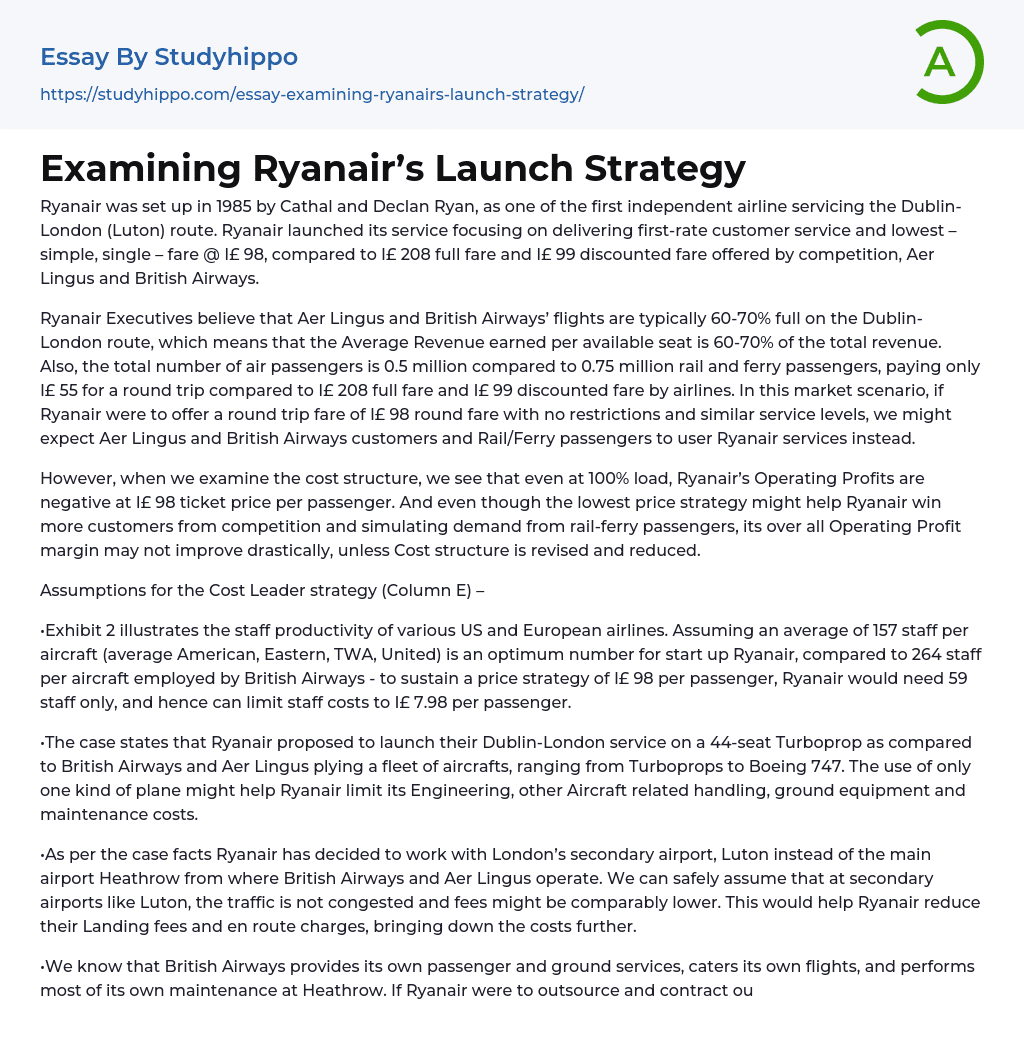Ryanair was set up in 1985 by Cathal and Declan Ryan, as one of the first independent airline servicing the Dublin-London (Luton) route. Ryanair launched its service focusing on delivering first-rate customer service and lowest – simple, single – fare @ I£ 98, compared to I£ 208 full fare and I£ 99 discounted fare offered by competition, Aer Lingus and British Airways.
Ryanair Executives believe that Aer Lingus and British Airways’ flights are typically 60-70% full on the Dublin-London route, which means that the Average Revenue earned per available seat is 60-70% of the total revenue. Also, the total number of air passengers is 0.5 million compared to 0.75 million rail and ferry passengers, paying only I£ 55 for a round trip compared to I£ 208 full fare and I£ 99 discounted fare by airlines. In this market scenario, if Ryanair were to offer a rou
...nd trip fare of I£ 98 round fare with no restrictions and similar service levels, we might expect Aer Lingus and British Airways customers and Rail/Ferry passengers to user Ryanair services instead.
However, when we examine the cost structure, we see that even at 100% load, Ryanair’s Operating Profits are negative at I£ 98 ticket price per passenger. And even though the lowest price strategy might help Ryanair win more customers from competition and simulating demand from rail-ferry passengers, its over all Operating Profit margin may not improve drastically, unless Cost structure is revised and reduced.
Assumptions for the Cost Leader strategy (Column E) –
•Exhibit 2 illustrates the staff productivity of various US and European airlines. Assuming an average of 157 staff per aircraft (average American, Eastern, TWA, United) is an optimum numbe
for start up Ryanair, compared to 264 staff per aircraft employed by British Airways - to sustain a price strategy of I£ 98 per passenger, Ryanair would need 59 staff only, and hence can limit staff costs to I£ 7.98 per passenger.
•The case states that Ryanair proposed to launch their Dublin-London service on a 44-seat Turboprop as compared to British Airways and Aer Lingus plying a fleet of aircrafts, ranging from Turboprops to Boeing 747. The use of only one kind of plane might help Ryanair limit its Engineering, other Aircraft related handling, ground equipment and maintenance costs.
•As per the case facts Ryanair has decided to work with London’s secondary airport, Luton instead of the main airport Heathrow from where British Airways and Aer Lingus operate. We can safely assume that at secondary airports like Luton, the traffic is not congested and fees might be comparably lower. This would help Ryanair reduce their Landing fees and en route charges, bringing down the costs further.
•We know that British Airways provides its own passenger and ground services, caters its own flights, and performs most of its own maintenance at Heathrow. If Ryanair were to outsource and contract out all these services to third-party providers, it would help limit its fixed costs and improve operating profit margin.
•British Airways sells tickets over phone, through retail point of purchase and agent network globally. If Ryanair were to contract this activity out to third party or use e-ticketing, it would help control cost of sales component and improve upon the operating profit margin.
In nutshell, the launch strategy that Ryanair has adopted is though valuable and rare at this point in the
market, but is quite imitable. With competition such has British Airways and Aer Lingus who have deeper pockets and sovereign backing, unless Ryanair differentiates itself on cost leadership, product/service benefits and branding, the current strategy won’t work, and would rather lead into a price war. Theoritically, the firms will keep driving down the price, till they reach their marginal costs, at which the economic profits will be zero, leading to exit of less profitable firms and consolidation in market place.
- Cars essays
- Bicycle essays
- Rms Titanic essays
- Renault essays
- Truck essays
- chrysler essays
- The city essays
- Racing essays
- Adidas essays
- Amazon essays
- Apple essays
- Bmw essays
- British Airways essays
- Burger King essays
- Coca-Cola essays
- Company essays
- Costco essays
- Dell essays
- Ebay essays
- Enron essays
- Facebook essays
- Ford Motor Company essays
- Gap essays
- General Motors essays
- Google essays
- Honda essays
- Ibm essays
- Ikea essays
- Intel essays
- Iphone essays
- Johnson and Johnson essays
- Kellogg essays
- Key essays
- Kfc essays
- Mcdonald's essays
- Microsoft essays
- Myspace essays
- Nestle essays
- Netflix essays
- Nike essays
- Nokia essays
- Pepsi essays
- Pepsico essays
- Red Bull essays
- Ryanair essays
- Samsung essays
- Sony essays
- Southwest Airlines essays
- Starbucks essays
- Supermarket essays




